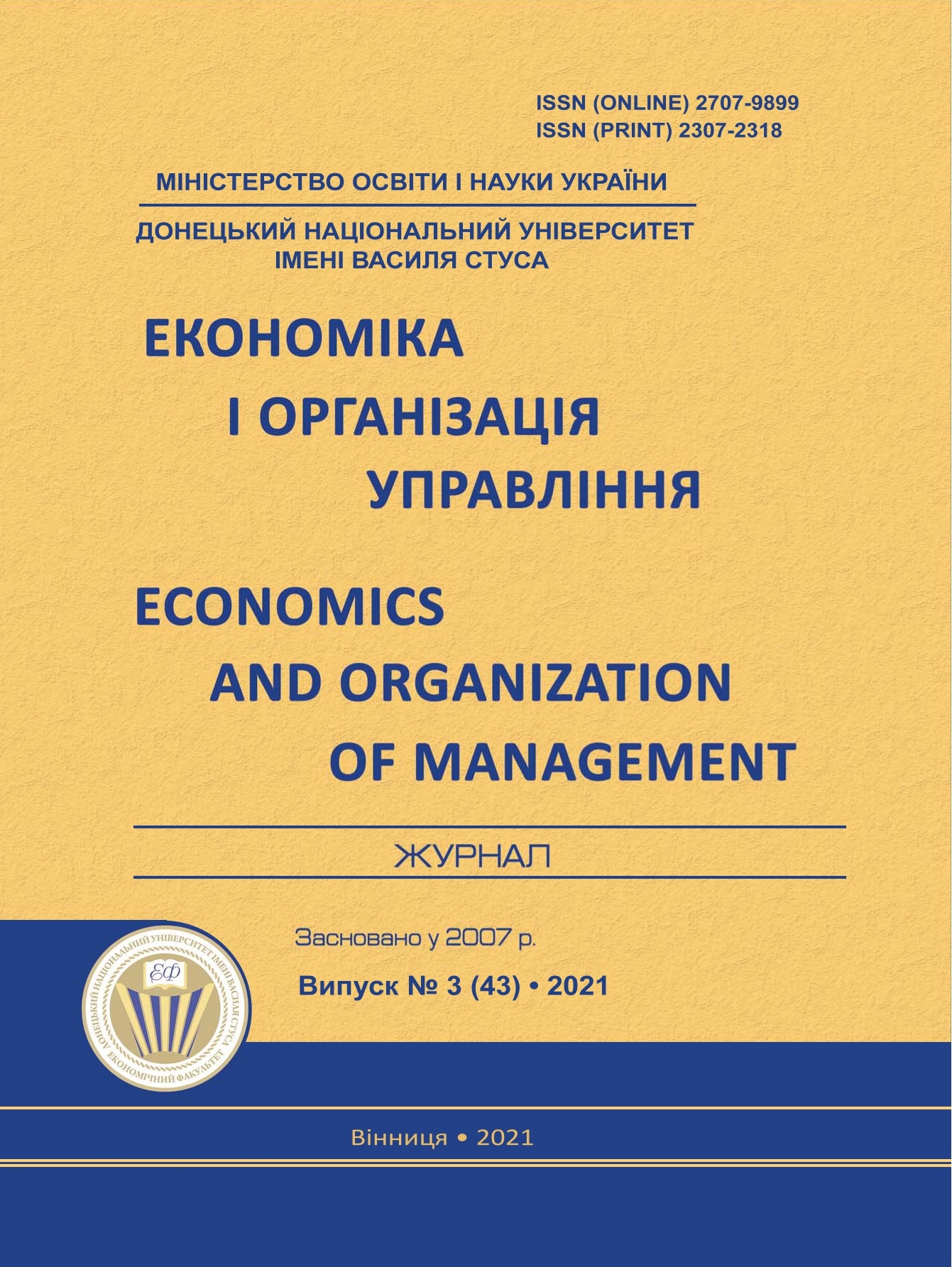Ormation of knowledge resources of the system of socio-economic development management of regions
DOI:
https://doi.org/10.31558/2307-2318.2021.3.4Keywords:
knowledge resource; formation; accumulation; specialists; managers; management system; socio-economic development; region; knowledge managementAbstract
The processes of formation of knowledge resource of specialists and managers of the regional management system are investigated. It is noted that in modern economic conditions, the knowledge resource is considered as the highest value, the quality of which does not decrease over time, but increases unlike all other types of resources, and without which no process of life in society is not carried out. The research focuses on the knowledge resource of specialists and managers of the management system of socio-economic development of the regions, which are the basic administrative-territorial units, the development of which ensures the development of the country as a whole. The formation of knowledge transfer processes and the organization of their mastery in higher education institutions are considered in relation to the completeness and compliance of this knowledge with the needs of regional management and economic entities of their managed systems. The needs and the list of priority program questions concerning the received knowledge are considered on a professional orientation of use of a knowledge resource. It is proposed to consider the process of mastering it by stages, content of programs, job and qualification requirements for specialists and managers to manage the development of regions. The logistic chain of formation of the process of knowledge acquisition as a knowledge resource of future specialists and managers of the management system is considered taking into account the content of needs of job competencies, requirements of positions, directions, programs and development plans of managed systems. The need to revise the methodology of organization of timely training, retraining and advanced training of specialists by integrating theoretical and practical content of training is emphasized. In the process of training it is proposed to use innovative teaching methods, trainings, master classes with the use of information base on existing and future positions of the planned employment. Requirements for wider application in the process of providing knowledge of smart education opportunities, benchmarking technologies, foresight, methods of innovative and strategic games and gaining experience in teamwork are identified. Suggestions for further development of knowledge management system and accumulation of knowledge resources of regions, technologies of formation and mastering of methods of its use and mastering are given, presented in author's realization of target preparation, retraining and advanced training in system of professional training of heads of system of management of regions.
References
Моисеев Н. Н. Быть или не быть… человечеству?: монография. Москва: ГУП ИПК «Ульяновский Дом печати», 1999. 288 с.
Національна парадигма сталого розвитку України; за заг. ред. Б. Є. Патона. Київ: Державна установа «Інститут економіки природокористування та сталого розвитку Національної академії наук України», 2012. 72 с.
Капіталізація економіки України / за ред. В. М. Гейця, А. А. Гриценка. Київ: Ін-т екон. та прогнозування, 2007. 220 с.
Вертакова Ю. В., Симоненко Е. С. Управление инновациями: теория и практика: учеб. пособие. Москва: Эскимо, 2008. 432 с. (Высшее экономическое образование).
Дзюба Т. Талалай В. Smart-освіта – розвиток сучасності // Smart-освіта: ресурси та перспективи: матеріали ІІ Міжнар. наук.-метод. конф. (Київ, 23 лист. 2016). Київ : Київ. нац. торг.-екон. ун-т, 2016. С. 34 – 37.
Тимоха С. Теоретичні основи розвитку критичного мислення студентів // Гуманізація навчально-виховного процесу. Вип. ІV. Ч. ІІ. Слов’янськ, 2011. С. 51 – 58.
Богатирьова К. Безперервна освіта – ознака Smart-суспільства // Smart-освіта: ресурси та перспективи : матеріали ІІ Міжнар. наук.-метод. конф., Київ, 23 листоп. 2016 р. Київ : Київ. нац. торг.-екон. ун-т, 2016. С. 22 – 23.
Тихомиров В. П. Мир на пути к smart education. Новые возможности для развития // Открытое образование. 2011. № 3. С. 22 – 28.
Волосович С. Пріоритетні складові старт-освіти в умовах суспільних трансформацій // Smart-освіта: ресурси та перспективи : матеріали ІІ Міжнар. наук.- метод. конф. (Київ, 23 лист. 2016). Київ : Київ. нац. торг.-екон. ун-т, 2016. С. 30 – 32.
Стадник В. В., Йохна М. А. Інноваційний менеджмент: навч. посіб. Київ : Академвидат, 2006. 464 с.
Бандур С. І. Стратегічні імперативи розвитку трудового потенціалу України // Ринок праці та зайнятість населення. 2013. № 1. С. 5 – 9.
Геєць В. М. Бар’єри на шляху розвитку промисловості на інноваційній основі та можливості їх подолання // Економіка України. 2015. № 1. С. 4 – 25.
Заяць Т. А. Розвиток регіонального освітнього менеджменту в контексті глобальних імперативів // Економіка і регіон. 2013. № 2. С. 16 – 20.
Ільїч Л. М. Взаємодія ринків праці та освіти: сутність, характерні риси та модель функціонування // Економіка та держава. 2017. № 4. С. 69 – 74.
Кримова М. О. Оцінка конкурентоспроможності молодих фахівців з економічною освітою на ринку праці України // Демографія та соціальна економіка. 2015. № 2. С. 53 – 64.
Лісогор Л. С. Освітні чинники забезпечення інноваційного людського розвитку // Науковий вісник Полтавського університету споживчої кооперації України. 2008. № 3(30). С. 421 – 424.
Гузар У. Є. Економіка знань та її перспективи для України // Регіональна економіка. 2009. № 1. С. 27 – 35.
Рак Н. Є. Економіка знань: сутність та фактори управління знаннями // Регіональна економіка. 2009. № 3. С. 224 – 232.
Класифікатор професій ДК 003:2010: Наказ Держспоживстандарту України від 28 липня 2010 р. № 327. Режим доступу: https://zakon.rada.gov.ua/rada/show/va327609-10#Text.

